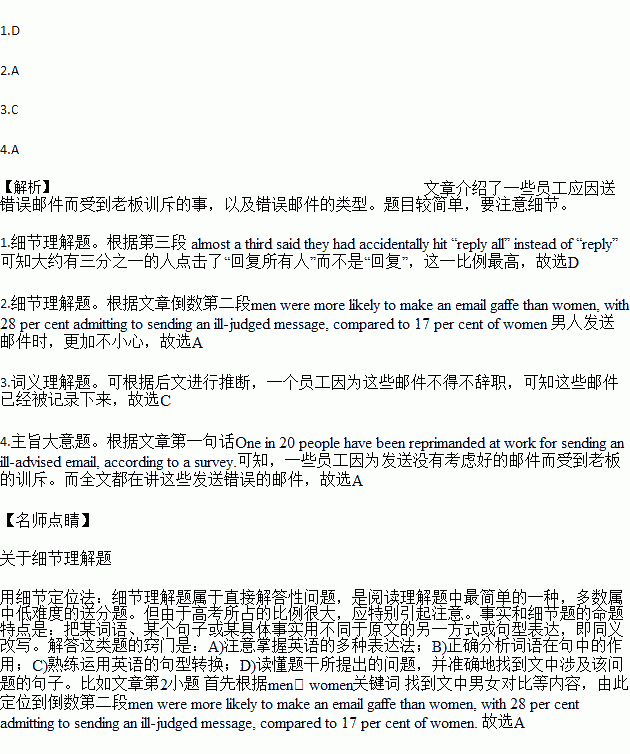题目内容
One in 20 people have been reprimanded (训斥) at work for sending an ill-advised email, according to a survey.
Inappropriate jokes, angry messages sent in the heat of the moment, and scathing email replies forwarded to the wrong people are among some of the email gaffes that have landed office workers in hot water with their employers or clients.
One in five of those questioned said they had sent an inappropriate email in the heat of the moment, while almost a third said they had accidentally hit “reply all” instead of “reply”.
More than one in 10 of the 2,000 people surveyed admitted they had mistakenly sent an email criticizing a colleague to the person they were insulting.
According to the research, carried out to mark the DVD release of Going Postal, the television adaptation of Terry Pratchett’s novel, men were more likely to make an email gaffe than women, with 28 per cent admitting to sending an ill-judged message, compared to 17 per cent of women.
There have been a number of well-documented email gaffes. Last year, a worker at Deloitte had to resign after emailing colleagues asking them to name the best-looking man in the office, while in 2000, nine members of the Financial Services Authority were suspended after forwarding copies of explicit emails.
1.Which takes up the highest percentage of the mistaken-sending?
A. Sending an unwise email.
B. Sending to a wrong person.
C. Sending an unsuitable email.
D. Sending to all instead of a particular one.
2.Compared with women, men, in dealing with emails, are .
A. more careless B. more conscious
C. more unreasonable D. more critical
3.The underlined word “well-documented” in the last paragraph probably means “ ”.
A. causing preventable problems
B. being copied without exception
C. having been frequently recorded
D. existing unexpectedly in people’s daily life
4.What may be the best title for the text?
A. Think before you send
B. Reduce email mistakes
C. Be aware of the result of a survey
D. Make good use of modern technology
 口算心算速算应用题系列答案
口算心算速算应用题系列答案 同步拓展阅读系列答案
同步拓展阅读系列答案

 se around 6:30 am and usually comes home around 5:00 pm or even 6:00 pm. However, I want her to know that by becoming a doctor, it doesn’t mean I’ll be successful. I’d rather follow my dreams and create my own future.
se around 6:30 am and usually comes home around 5:00 pm or even 6:00 pm. However, I want her to know that by becoming a doctor, it doesn’t mean I’ll be successful. I’d rather follow my dreams and create my own future.